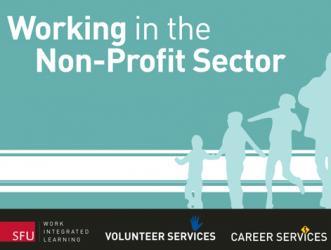
The following post is from our archive of the 2010 event "Working in the Non-Profit Sector".
How do you acquire a successful and rewarding career? For five professionals, it was working for community organizations in the non-profit sector. The non-profit sector gave them the opportunity to contribute their professional skills, experiences and passions to advance their career while making a positive difference in their communities. Recently, they sat down with SFU students and shared their personal stories and journey to their current positions.
SFU Volunteer Services teamed up with Career Services to bring together five panelists to discuss the career possibilities in the non-profit sector at the popular “Working in the Non-Profit Sector” panel. This event offers students a wonderful opportunity to learn more about the non-profit sector and why they should consider starting a career with a not-for-profit organization.
These passionate and inspirational speakers included Ms. Carolyn Sinclair, re-organization coordinator, BC Crime Prevention Association; Ms. Farah Kotadia, HR and communications director, DIVERSEcity; Ms. Leslie Nadon, general manager, Dance International Magazine; Ms. Rhea Kikkert, counselor, SHARE Society; and Ms. Jeanine Bond, conservation programs specialist, Ducks Unlimited.
These five panelists all agreed that working in the non-profit sector is a rewarding and conscious career choice because of its flexibility, diversity and emphasis on work-life balance.
Even if it was just a couple of minutes working overtime, many speakers mentioned that their supervisors would urge them to stop working and go home. One panelist revealed that her friend, who works in the corporate sector as an accountant, often works over 100 hours a week. Note that this is an extreme example and that not all positions in the private sector would require employees to work this many hours.
However, having worked in the private sector, these panelists enjoyed the non-profit sector a lot more because of its emphasis on work-life balance, which is extremely important if you have a family or want to start one soon. Many speakers also mentioned that their work schedules can be quite flexible; for example, Ms. Kotadia, an SFU Communications alumnus, mentioned that if she has to work overtime today for a meeting or event, she can bank those hours and leave work early the next day.
Most importantly, however, the panelists commented that what attracted them to stay in the non-profit sector rather than going back to the private sector was their dynamic roles and responsibilities. They noted that their positions grew with them over time, and as such they could use their creativity and expertise to shape their jobs as they see fit with their organizations’ goals and objectives.
Because positions in the non-profit sector are so dynamic, it means that there are lots of learning opportunities for you to acquire professional skills and experiences that you may not have a chance to from your university studies. Ms. Nadon, another SFU alumnus, explained that she was never good with math and was obviously the reason why she did not major in Math or Science but Contemporary Arts. However, because of her current position, she has the opportunity to take additional classes to learn about accounting and bookkeeping.
Aside from the workplace flexibility and dynamic job duties the non-profit sector offers, if you are someone who enjoys networking and meeting new people, the sector will offer you plenty of opportunities to do so. Because not-for-profit organizations rely on volunteers to help deliver their services to their communities, you will have the chance to meet people of different ages, backgrounds and occupations.
So how do you find work in the non-profit sector? Although there is no one specific way, these speakers strongly recommend students to volunteer whenever they can because there are often “hidden” positions within an organization that you would not know about if you are not working or volunteering with them. Volunteering is also a great way to network and build relationships with potential employers and colleagues who may connect you to hidden opportunities in the job market.
Is working in the non-profit sector a conscious career choice then? According to these five professionals, it is. In fact, it is a rewarding career choice because you support the causes you care about through your work, whether it be a cultural, environmental or social issue. What’s better than a career where you get to make a positive difference in your community and the world and earn some money too?















